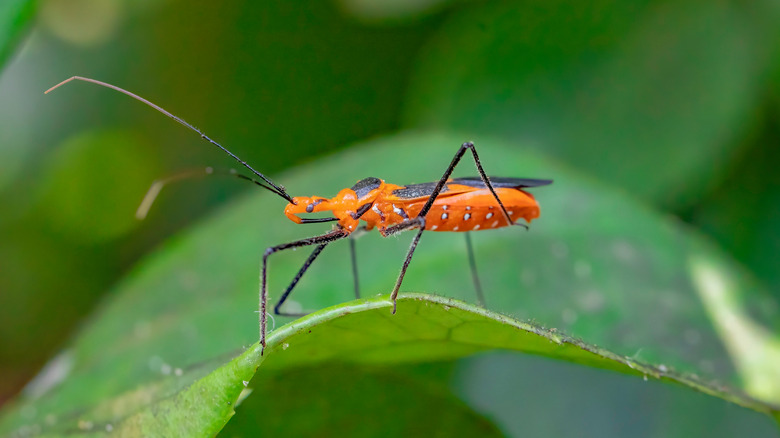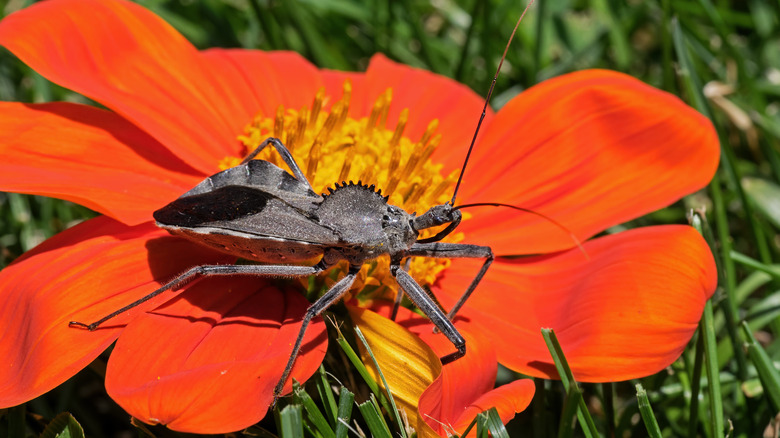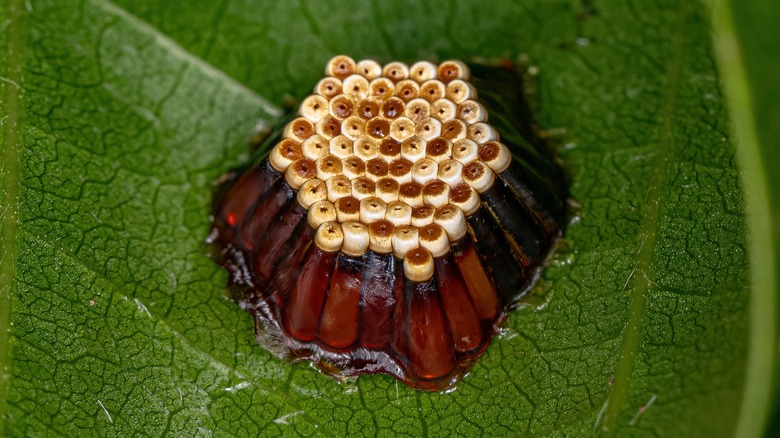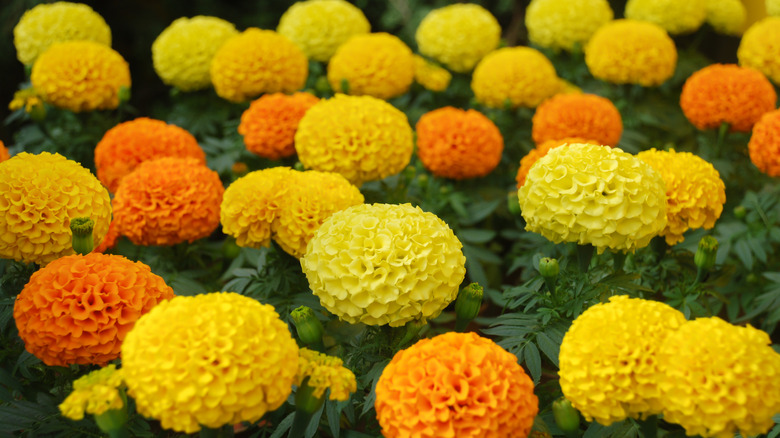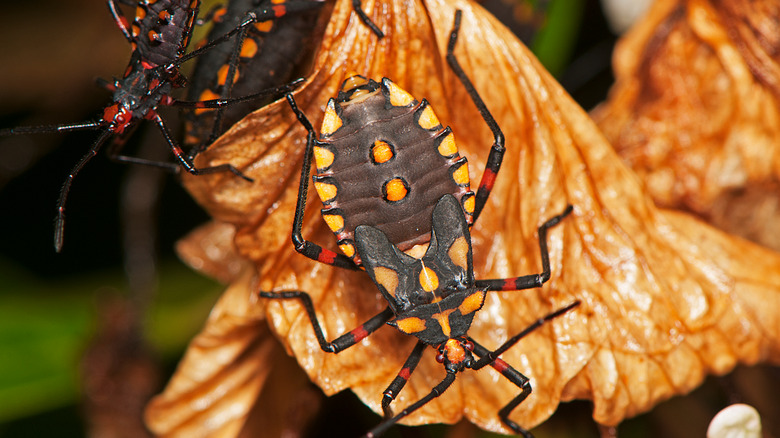What Is An Assassin Bug And How Are They Good For Your Garden?
Assassin bugs (family Reduviidae) are long-legged predatory insects that are great for folks' gardens because they prey on other insects such as caterpillars, bees, flies, and other bugs, according to City Bugs. They'll control the pests ruining your garden so that you don't have to with pesticide sprays. While they can seem scary, they're the ones that will make your garden thrive. There are over 7,000 species of assassin bugs within North, South, and Central America and Mexico.
Assassin bugs come in similar shapes and colors, but in order to host them in your garden, they need to be enticed and welcomed. Even though they're great for keeping unwanted pests away from your growing fruits or vegetables, they can sometimes make their way into your home. Therefore, it's best to grow your garden away from any easy entrances into your home and allow them to stay in the area they're needed in.
Types of Assassin bugs
The wheel bug is the most common assassin bug and is known for killing larger insects like grasshoppers and caterpillars. They're gray, about 1 ½ inches big, and have an elongated neck with a semicircular head on top of its thorax, according to Britannica. The wheel bug kills the insects with a quick poke of its beak that's filled with venomous saliva. They're found in North America.
Ambush bugs are straightforward with their attacks. They hide in flowers that camouflage them while they wait for their prey. Once they see their target in sight, they don't hesitate to capture them with their large fore-femurs.
The milkweed assassin bug is the most distinctive bug of the genus Zelus species. They're bright red and black in color and are mostly widespread in Galveston County in Texas. Part of their food diet includes eating aphids, armyworms, stink bugs, houseflies, and more, per Aggie Horticulture.
Assassin bug life cycle
Assassin bugs undergo three growing stages when the female lays her eggs, according to ThoughtCo. The female assassin bugs lay their eggs twice a year in the spring, then again in the fall. They lay their eggs on plants, leaves, or stems in which they stay in their cluster until they each hatch as a wingless nymph, said Plant Care Today. Once assassin bugs hatch, they get busy feeding on pests right away, which makes them grow quickly. They go through various growing stages until they become adults and can live for several years. Depending on the assassin bug, they could go through three to four stages of growth where they molt or shed their skin as they become adults.
They can resist living in temperatures from below zero to 80 degrees Fahrenheit, and they thrive in moist, humid environments. They usually live in colder climates where they overwinter as adults.
How to care for them
Coexistence is key when it comes to having assassin bugs in your garden. To keep them happy and continue doing their job, folks should restrict some maintenance in their gardens. For example, don't mow too close to where the bugs are situated or prune too often, according to Plant Care Today. Also, refrain from using any sort of pesticide spray in your garden to prevent upsetting the assassin bugs. Once they get to work, you won't need to use pesticide sprays in your gardens because the bugs will get rid of those pests for you.
They can sometimes find their way inside homes, so if this happens, just cover them with a cup, slide a piece of paper underneath, and take them outside. They'll sometimes, but rarely, go inside during the winter months, but they mostly prefer to stay outdoors. Often during peak season of hot weather, an abundance of assassin bugs will show up in your garden to keep unwanted bugs out. Before they show up, be prepared to welcome them with flowers where you'd like them to stay and a trail of water to keep them in the garden.
How to install them
There isn't a store where you could purchase assassin bugs, so you have to lure them into your garden. Since there are a variety of assassin bug species, they all have similar habitats. You can find them in rainforests, rocky areas, animal nests, and woodpiles, according to Animals Network. They tend to travel alone once they become adults since they're also an insect that's hunted by other bugs. If you're having trouble luring assassin bugs to your garden, you could get some insects they usually prey on, like caterpillars or ladybugs, to try to attract them. It takes patience for them to show up.
Bob Vila suggests illuminating your garden since the bugs are attracted to light. Decorating your garden with string lights lined up around it or creating a path inside could get their attention. Some can be a bit shy, so spreading mulch out on the soil can give them a comfortable place to hide and wait for their prey. Filling your garden with flowers will definitely welcome assassin bugs. They are attracted to marigolds and tansy, which you could add to your veggie patch and they'll get to work right away. They'll find their way to your garden when they know they're welcome.
Are they safe?
If you decide to lure these killing machines into your garden, beware for your safety and your pet's safety. Even though a bite from an Assassin bug may not need medical attention, it's best to be safe. Some bites may cause swelling where they leave their mark, but others can cause diseases. Kissing bugs, another Assassin bug, can transmit Chagas, an inflammatory, infectious disease, through its feces that can lead to heart and digestive problems if it's left untreated, according to Mayo Clinic. The bugs can get infected with this disease after they've been feeding on leaves containing parasites, which then stick on their skin and then transmit it to people through the eyes, mouth, a cut, or bite from the bug. The kissing bugs are found in Central America, South America, and Mexico.
When you're infected with the disease, you can experience mild to severe symptoms such as fever, rash, eyelid swelling, and swollen glands. Some severe symptoms include heart failure, irregular heartbeat, and stomach pain due to enlarged colon. You should see a doctor if you've traveled to an area that has kissing bugs and you're experiencing mild symptoms.
